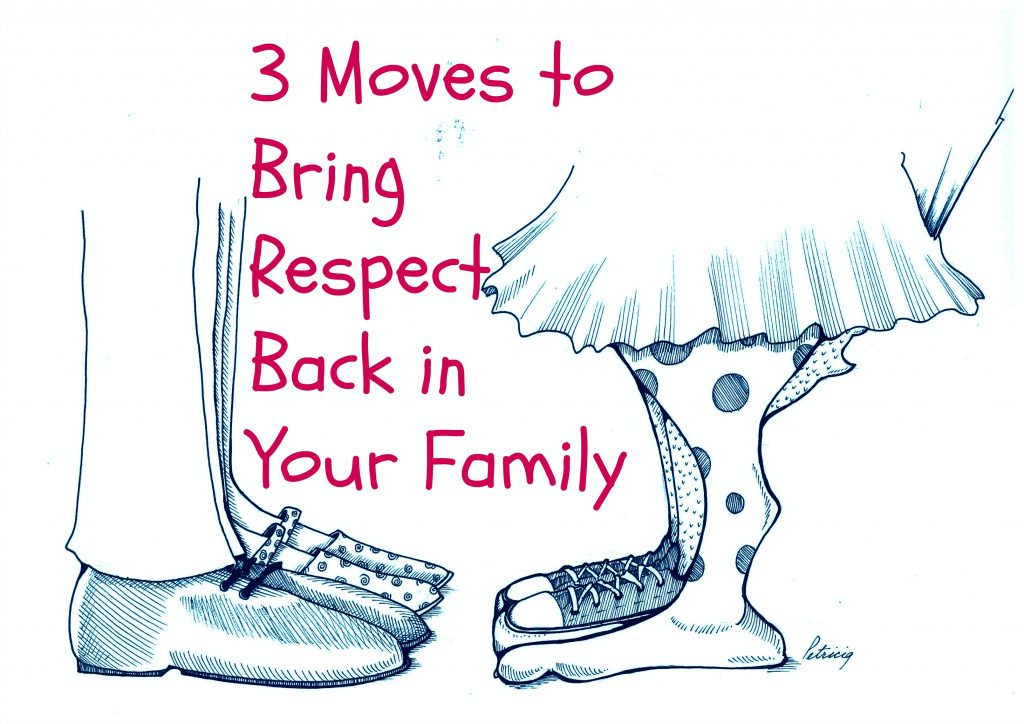Podcast: Play in new window | Download
Subscribe: RSS
It’s a standoff between parents and their two kids. Kevin and Heidi have finally come together to bring respect back into their marriage. Now it’s time to get Brandon and Stacy on board. However, the kids remain defiant, in mocked attire. The picture above is taken from chapter 5 in my book that discusses how to bring respect back into your family. I’ll get to how these parents changed the family culture a little later. For now, let’s focus on a major problem in families today.Families are upside down!
The structure in many families is inverted. Kids have more power than parents. In the past, kids feared disappointing their parents. Today, parents fear their kids disliking them! Kids control relationships in the family. They say the nastiest things to exert their power. What’s more disturbing is how parents tolerate this rude behavior.How did families flip?
Why do kids today get a pass on behavior that would never fly in past generations? Is it that we have evolved as families into something more democratic? Or have kids usurped the authority of parents? I can devote an entire blog to analyze the flip. Instead, I’ll focus on two primary culprits: fear and guilt. These negative emotions are primary motivators of current parenting styles.- Parents fear their kids failing.
- Failing kids translates to failing parents.
- Busy parents feel guilty they are not giving their kids enough of themselves.
- Kids push the guilt button to get what they want.
First Move: Parents Model Respect with Each Other
You cannot expect from others what you don’t give. “I’m your parent, show some respect!” – is not a good approach. Establishing respect lies squarely on the shoulders of parents. You don’t demand respect. You command it. The difference between “demanding” respect and “commanding” respect- Demanding is words and threats
- Commanding is actions that make others feel safe and respected – based on how you treat people in all situations
- How they communicate: words, tone, non-verbals
- How they work together to lead the family
- How they handle problems, support each other
- How they resolve conflict when it occurs in front of the kids
Second Move: Parents Show Respect to their Kids
If you want to command the respect of your kids you must give it to them first. You don’t do it by caving in to their demands. Here are some target behaviors you want to show your kids.- Love your kids unconditionally. Don’t base love on behavior.
- Set a positive tone when you interact.
- Maintain emotional control in tense situations. Do not come unglued.
- Listen with the intent to understand your kid.
- Be firm in your position, maintaining control when they react negatively to limits you set.
Third Move: Parents Set the Bar of Respect for the Family
Kevin and Heidi got the first two moves down. Now it was time for the third. They had a “sit down” with their teens. In this meeting they set a bar of respect for the family. It was a simple rule. “Rudeness out. Respect in.” No longer were Brandon and Stacy allowed to be rude to each other or their parents. If they had a problem they it had to be addressed respectfully. The parents accomplished this by doing a two-step dance. The kids were expected to do a one step dance.- Parents: step in and step back
- Kids: step up
Doing the two-step dance: stepping in and stepping back
#1: Stepping in to teach your kids a rule or expectation you have about respect- Teaching the rule – “rudeness is not tolerated in the family”
- Linking the rule to a value – “we value respect in our family”
- Explaining the consequence (+ or-) ahead of time – “if you act rudely you will restrict yourself from (fill in the blank) for the rest of the day.”
- Looking for kids’ compliance
- Being patient as they learn through testing limits
- Now that they know the rules about showing respect it is up to them to step up their behavior.
- It will take time for them to learn
- Expect them to challenge the rule and test your leadership
- Initial warning that their behavior is leading toward a negative consequence
- Enforcing a consequence when child refuses to show respect
- Complimenting child on respectful behavior
- Rewarding respectful behavior

